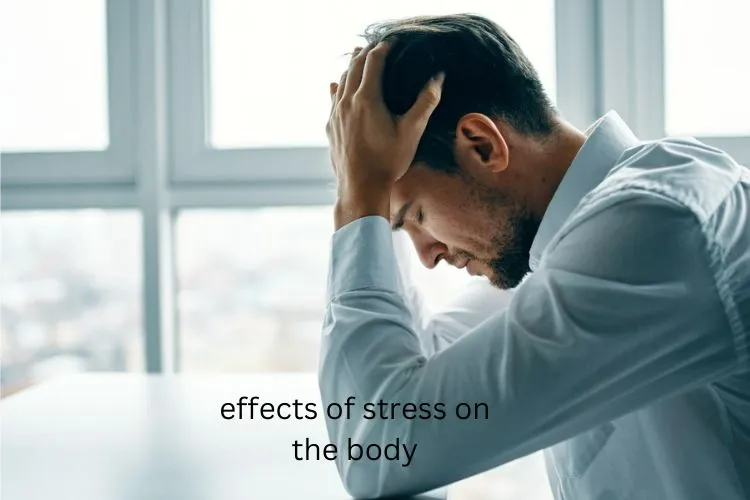What does stress do to your body?

Stress has an impact on all of us. When disciplining your children, managing your finances, or dealing with a difficult relationship, you may experience stress symptoms. While some stress could be beneficial, too much stress can deplete your energy and lead to individuals being sick, whether mentally or physically. The very first step in stress management is to understand the signs of stress. However, detecting stress signs may be more difficult than you believe. Most of us are so used to being stressed that we don’t realize we’re stressed until we’ve reached our breaking point.
What Is Stress?
Stress is the body’s reaction to dangerous conditions, whether they are actual or imagined. When you are endangered, the body experiences physical responses that permit you to take action to protect yourself. This is referred to as the “fight-or-flight” reflex and the stress response. During the stressor, your heart rate increases, your breathing becomes faster, your muscles tighten, and your blood pressure rises. You’ve prepared to act. It is how you defend yourself.
Stress is perceived differently by various people. What causes stress in one individual may be irrelevant to another. Some people are more skilled at dealing with stress than others. And not all stress is bad for you. Our bodies are designed to endure mild stresses. However, humans are not designed to deal with long-term, chronic stress without consequences. Stress, in moderation, can help you finish activities and avoid damage. For example, tension may drive you to slam on the brakes to avoid colliding with the vehicle ahead of you. That’s fantastic news.
What are you stressed about? Talking about stress gives you a different perspective and a coping tool to manage it effectively. Our online counselors can help you to deal with your stress.
What are the Effects of stress on the Body?
Stress may affect many aspects of your life, including your emotions, behaviors, cognitive abilities, and physical health. There isn’t a single area of the body that is immune. However, because people manage stress differently, distress symptoms might differ. Symptoms may be confusing and overlap with those caused by medical conditions. As a result, it is vital that you consult with your doctor about them. You might have any of the following stressors:
Physical effects of stress include:
• Low energy
• Headaches
• Upset stomach, including diarrhea, constipation, and nausea
• Chest pain and rapid heartbeat
• Insomnia
• Frequent colds and infections
• Loss of sexual desire and/or ability
• Nervousness and shaking, ringing in the ears, and cold or sweaty hands and feet
• Dry mouth and a hard time swallowing
Effects of stress on Cognition and Behavioral include:
• Constant anxiety
• Restless thoughts
• Forgetfulness and disorganization
• Inability to concentrate
• Poor decision-making
• Being pessimistic or only perceiving the negative
• Changes in appetite – either not eating or eating excessively
• Avoiding obligations and procrastinating
• Increased consumption of alcohol, drugs, or smokes
• Exhibiting increased anxious behaviors such as nail biting, fidgeting, and pacing
Effects of stress on emotions include:
• Easily becoming angry, frustrated, and moody
• Feeling overwhelmed as if you’re losing control or need to establish authority
• Having trouble relaxing and quieting your mind
• Negative self-esteem and feelings of loneliness, worthlessness, and depression
• Avoiding others.
What Are the Long-Term Effects of Stress?
A little strain here and there is nothing to be concerned about. Chronic stress, on the other hand, can induce or aggravate a variety of significant health concerns, including:-
• Mental health problems, such as depression, anxiety, and personality disorders
• Cardiovascular disease, including heart disease, high blood pressure, abnormal heart rhythms, heart attacks, and strokes
• Obesity and other eating disorders
• Menstrual problems
• Sexual dysfunction, such as impotence and premature ejaculation in men and loss of sexual desire in men and women
• Skin and hair problems, such as acne, psoriasis, eczema, and permanent hair loss
• Gastrointestinal problems, such as GERD, gastritis, ulcerative colitis, and irritable colon
Learning to react to stress in a healthy way
Life is full of stressful situations. And you might not be able to modify your existing circumstances. However, you may take action to mitigate the impact of these occurrences on you. You may learn to recognize what causes stress and how to care for yourself physically and emotionally in challenging situations. Chronic stress can wreak havoc on your mind and body. So let’s take steps to control stress:-
• Recognizing the signs and symptoms: These signs differ, but if a person can understand their individual stress signals, they will be better equipped to handle them.
• Finding triggers is not always easy to avoid stressors. Taking note of particular triggers, on the other hand, might assist a person in developing coping and management methods, which may include decreasing exposure.
• Prioritize your duties while reducing non-essential sources of stress. This might involve refusing certain obligations, setting boundaries with others, or delegating some duties.
• It is extremely important to practice adequate self-care when under persistent stress. Allow yourself time to relax, eat a healthy diet, exercise frequently, and learn how to protect your sleep.
• While relationships can bring long-term stress, having supportive people in your life can also act as an important buffer against acute and chronic stress. According to studies, social support is vital for both physical and mental health. Support not only helps people become more resilient but also prevents them from developing mental illnesses as a result of stress and trauma.
• Conversing with a mental health professional is another great way to get control of your stress and lessen its harmful impact on your health. Your therapist may help you identify the sources of stress in your life and develop a plan for dealing with them. This might entail practicing new coping strategies or learning new ways to deal with difficult people.
“Stress acts as an accelerator: it will push you either forward or backward, but you choose which direction.”
―Chelsea Erieau
Learn to deal with your stress by talking to our online therapist from www.ganeshaspeaks.com. The first consultation is free.
Talk to Online Therapist
View All










